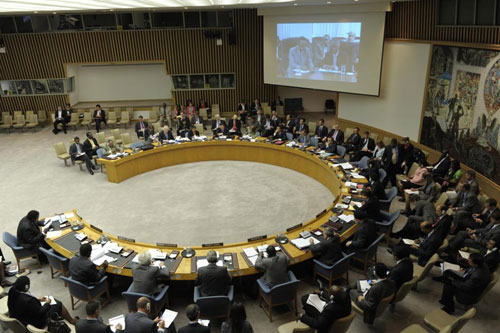
A new U.N. report published last month caused a few tremors in an already politically precarious region of East Africa. The Monitoring Group on Somalia and Eritrea, which was charged with examining compliance with arms embargoes on the two countries, submitted a meticulously documented 417-page report that sheds light on official Eritrean complicity in an expansive network of illicit activities, ranging from arms trafficking, to people smuggling, to support of armed groups in neighboring countries, and raises questions of Eritrea involvement in the new state of South Sudan.
The report’s most damning finding was that the Eritrean government “conceived, planned, organized and directed a failed plot” to bomb civilian and governmental targets in Addis Ababa during the January 2011 African Union summit. While the government denied the veracity of the report’s findings, the following day, Eritrea coincidentally rejoined the Intergovernmental Authority on Development, or IGAD, after four years of absence, “due mainly to the current developments in the east African region including the independence of Southern Sudan and humanitarian crisis at the Horn of Africa,” as reported by the Sudan Tribune.
Regarding Sudan, the report contends that senior Sudanese and Eritrean government officials have engaged in a multi-million dollar contraband trade network between the two states, including arms trafficking from Eritrea to Sudan, with a direct link to the Eritrean embassy in Sudan. Government figures implicated include Eritrean commander General Kifle “Manjus” and his Sudanese counterpart, Mabrouk Mubarak Salim, the current minister of state for transport in Sudan. The role of diplomatic headquarters is highlighted:
The embassy of Eritrea in Khartoum uses funds raised from contraband [trade?] to purchase agricultural goods required in Eritrea, as well as acquire oil and gas products at discount rates from the Sudan. But the funds are also dispatched to armed groups in the region and used to procure military equipment.
The Monitoring Group also investigated suspicions that two former high-ranking SPLA officials who are currently leading insurrections in South Sudan, George Athor and Peter Gatdet, received Eritrean backing. South Sudan has long suffered from insecurity at the hands of militia groups within its borders, a threat that remains even after independence. After examining weapons seized by the SPLA from these militia forces (some of which matched weapons supplied by Eritrea to Ethiopian rebel group ONLF), the group assessed that the evidence indicated “a military logistical relationship” between Sudan and Eritrea, but cannot ultimately confirm that Eritrea provided “direct military assistance to groups engaged in the destabilization of southern Sudan (…)”
Overall, the report warns that networks that have been under supervision by Eritrean officers and used for “intelligence collection, illicit financial operations, people smuggling, and other forms of support to conventional armed groups” may now serve as support networks for more nefarious and potentially violent operations in Sudan, Somalia, Djibouti, and Ethiopia.
The Monitoring Group’s work is hardly finished. One day after the report’s release, the U.N. Security Council voted unanimously to extend the group’s mandate. It has been tasked, among other things, to compile a list of individuals and entities engaged in illicit trade activities inside and outside Eritrea, and to devise ways to boost overall compliance with the existing arms embargoes.
In a region that has suffered gravely from armed militias and insecurity, the findings and continued work of the Monitoring Group are critical for establishing stability in the region, including for the nascent state of South Sudan.
Photo: The U.N. Security Council extends the mandate of the Eritrea and Somalia monitoring group (UN News)

